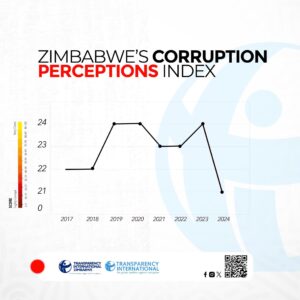
Marshall Bwanya
Harare – Zimbabwe has always slipped down the slope in corruption rankings since the turn of the millennium, and the latest Transparency International (TI) Corruption Perceptions Index (CPI) for 2024 confirms this grim trajectory.
Scoring a dismal 21 out of 100, Zimbabwe now ranks 158th out of 180 countries, a significant drop from its already poor standing in previous years.
This decline underscores a deepening crisis, one that has eroded public trust, crippled healthcare, service delivery, and stifled economic growth.
The roots of this decay are deeply entrenched, and the lack of political will to address it has only exacerbated the suffering of ordinary Zimbabweans.
Historically, Zimbabwe’s corruption woes can be traced back to the early 2000s, when economic mismanagement and political instability began to take their toll.
Under former President Robert Mugabe, patronage networks flourished, and state resources were routinely siphoned off by the political elite.
The land reform programme, while politically significant, was marred by allegations of cronyism and unfair distribution, setting a precedent for systemic corruption.
When Emmerson Mnangagwa assumed power in 2017, there was a glimmer of hope that his administration would usher in a new era of accountability.
However, the reality has been starkly different.
Under Mnangagwa’s leadership, corruption has not only persisted but has become more brazen.
High-profile scandals involving individuals closely linked to the president have become emblematic of this era.
One such figure is Wicknell Chivayo, a controversial businessman who has been embroiled in multiple scandals involving inflated government tenders.
Chivayo’s dealings with the Zimbabwe Electoral Commission (ZEC) in 2024, where voting materials were procured at grossly inflated prices, starkly illustrate the extent to which corruption has permeated state institutions.
The fact that such scandals occur with impunity underscores the absence of political will to address graft at its root, allowing corruption to persist unchecked within critical state institutions.

Consequences of this unchecked corruption are dire.
For ordinary citizens, it translates into deteriorating public services, from healthcare to education, employment and infrastructure. Hospitals lack essential medicines, roads are riddled with potholes, and schools struggle to provide basic resources.
Meanwhile, the economy continues to haemorrhage, with an estimated US$1,8 billion lost annually to corruption, according to Prosecutor General Loice Matanda Moyo.
This loss of revenue deprives the government of funds needed for development, perpetuating a cycle of poverty and inequality.
The selective enforcement of anti-corruption laws further compounds the problem.
This selective justice not only undermines public confidence in institutions but also emboldens those in power to continue their illicit activities.
The recent Al Jazeera “Gold Mafia” series, which implicated Mnangagwa’s inner circle in illicit gold trading and money laundering, is a stark reminder of how deeply corruption is woven into the fabric of Zimbabwe’s governance.

Even within Zanu PF, there are murmurs of discontent.
Vice President Constantino Chiwenga’s recent public acknowledgment of rampant corruption is a rare admission, but it rings hollow given the lack of political will to curb corruption.
Without genuine commitment from Zimbabwe’s leadership, these calls against rampant corruption are likely to fall on deaf ears.
Zimbabwe stands at a crossroads.
The road to recovery requires more than just rhetoric, it demands concrete action to dismantle the networks of corruption that have brought the nation to its knees.
Until then, the citizens of Zimbabwe will continue to bear the brunt of a system that prioritises personal gain over public good.
The time for accountability is now, lest the nation slides further into decay.


Comments are closed.